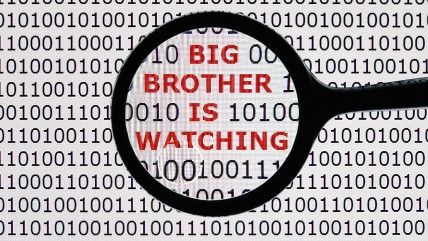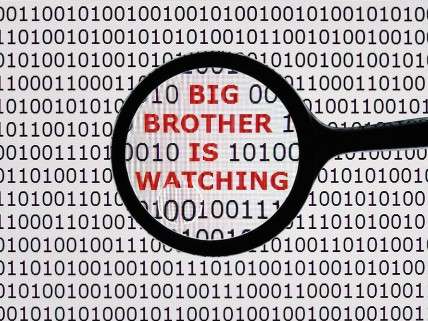Mass Surveillance Has a "Chilling Effect" on Online Expression
The people who say they "have nothing to hide" are the most skittish about commenting on controversial topics on social media.

Turns out people who believe they have

"nothing to hide" hold back more than anyone else when it comes to expressing "minority" opinions on social media.
A study published in Journalism & Mass Communication Quarterly, titled "Under Surveillance: Examining Facebook's Spiral of Silence Effects in the Wake of NSA Monitoring" theorizes, "knowing one is subject to surveillance and accepting such surveillance as necessary act as moderating agents in the relationship between one's perceived climate of opinion and willingness to voice opinions online."
Put more succinctly, even though most Americans have some working knowledge of the revelations laid bare in 2013 by former NSA contractor Edward Snowden of the agency's mass surveillance of the population, and even though a majority of Americans deem such generalized snooping "unacceptable," the mere knowledge that online communications are "subject to government interception" influences "conformist behavior."
Motherboard summarized the study's methodology:
The paper is based on responses to an online questionnaire from a random sample of 255 people, selected to mimic basic demographic distributions across the US population.
Participants were asked to answer questions relating to media use, political attitudes, and personality traits. Different subsets of the sample were exposed to different messaging on US government surveillance to test their responses to the same fictional Facebook post about the US decision to continue airstrikes against the Islamic State of Iraq and Syria (ISIS).
They were then asked about their willingness to express their opinions about this publicly—including how they would respond on Facebook to the post; how strongly they personally supported or opposed continued airstrikes; their perceptions of the views of other Americans; and whether they supported or opposed online surveillance.
The results indicated that people who perceived their own opinions to be in the minority were less likely to comment, but so were people who felt their opinions were in the majority yet believed that government surveillance of their online activity was necessary.
The study's author, Elizabeth Stoycheff of Wayne State University told the Washington Post:
"The fact that the 'nothing to hide' individuals experience a significant chilling effect speaks to how online privacy is much bigger than the mere lawfulness of one's actions. It's about a fundamental human right to have control over one's self-presentation and image, in private, and now, in search histories and metadata," she said.
Stoycheff is also concerned about the quietly oppressive behavior of self-censorship.
"It concerns me that surveillance seems to be enabling a culture of self-censorship because it further disenfranchises minority groups. And it is difficult to protect and extend the rights of these vulnerable populations when their voices aren't part of the discussion. Democracy thrives on a diversity of ideas, and self-censorship starves it," she said. "Shifting this discussion so Americans understand that civil liberties are just as fundamental to the country's long-term well-being as thwarting very rare terrorist attacks is a necessary move."
Writing at The Atlantic, Kaveh Waddel notes that "a simple reminder of everyday surveillance" can also affect people's behavior in non-digital life:
Studies have shown that being watched can make people less likely to commit some crimes, or to act in ways that don't conform to widely held morals.
One 2013 study, for example, found that when restaurants installed monitoring software to alert managers about stealing employees, weekly revenue went up, suggesting that employees were changing their behavior in response to the knowledge that they were being watched.
But commenting on controversial topics isn't the same as skimming off your employer's bottom line. The "self-censorship" caused by the spectre of Big Brother watching our 0s and 1s isn't likely to do much besides make people's personally-curated echo chambers even more homogeneous. As Stoycheff said, government surveillance "changes the assumption that we've been working on this whole time, that the Internet is a safe space for deliberation."
If the people who feel they have "nothing to hide" decide to pre-emptively hide their ideas and opinions, then the robust exchange of ideas through which we all have something to potentially learn from one another is threatened.
Watch Reason TV's interview with Edward Snowden below.


Show Comments (58)